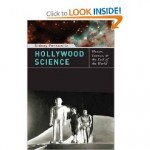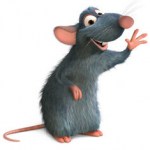Books
One of the unwritten rules of creating a good horror yarn is that the location your story takes place in has to be as frightening as your monster. The setting almost has to act an an extension of the bloodthirsty antagonist; a place that can more easily be seen as its lair than a place of human habitation. In Lincoln Child's latest novel Terminal Freeze that place is Fear Base, a rotting military facility shivering the the shadow of Fear Glacier, and it is stalked by something utterly horrifying.
Readers of The Relic, another horror novel penned by Child and his sometimes partner Douglas…
It's just not Google's week. A mob of angry villagers north of London formed human chains and chased off the Google Maps car (no word whether they had torches). Microsoft is all up in Google's business (to be precise, they're funding a team at New York Law School's Institute for Information Law and Policy, led by a former Microsoft programmer, which is weighing in on the pending settlement of Google's book-scanning lawsuit). And it's not just Microsoft that's taking aim at Google: the NYT has an overview of the many parties, from librarians to law professors, who have serious doubts about…
tags: Birdbooker Report, bird books, animal books, natural history books, ecology books
"One cannot have too many good bird books"
--Ralph Hoffmann, Birds of the Pacific States (1927).
The Birdbooker Report is a special weekly report of a wide variety of science, nature and behavior books that currently are, or soon will be available for purchase. This report is written by one of my Seattle birding pals and book collector, Ian "Birdbooker" Paulsen, and is edited by me and published here for your information and enjoyment. Below the fold is this week's issue of The Birdbooker Report which…
Today's free book is "Hollywood Science: Movies, Science, and the End of the World" by Sydney Perkowitz. (If you click over the Amazon page linked above, you'll see a review by scibling Brian Switek of Laelaps.)
Remember: To claim the book, be the first commenter to earnestly affirm that you will read and review the book in less than 6 months. Then send me your snail mail address via my science (dot) woman account on google's mail service.
Today's free book is "Einstein for Beginners" a comic style introduction to Einstein's life and work by Joseph Schwartz and Michael McGuiness
To claim the book, be the first commenter to assiduously affirm that you will read and review the book in less than 6 months and then send me your snail mail address to science dot woman @ google's mail service.
The Bible I want on my bookshelf is the Robert Crumb Version. He's got one chapter done: Crumb is about to publish his version of Genesis, which will be a "scandalous satire" which "presents a complex, even subversive, narrative that calls for a significant re-examination of both the Bible's content and its role in our culture". Sounds fun!
Of course, we'll never have a complete RCV Bible. No one could ever drop enough acid to do Revelation right.
I'm very busy this week, with visitors to our department, a stack of grading, and the usual drive to do more research and be a better mommy. Alice isn't in any better shape. I was wondering how I was going to write anything for the blog. And I was also contemplating a bookshelf full of books I'll never have time to read. A ha! I'll give the books to better homes via my blog...now that's effective multi-tasking.
Three times this week, I'll be giving away a book from my shelf to the first reader who promises to read the book in a timely fashion (6 months) and report back with a review on their…
tags: Birdbooker Report, bird books, animal books, natural history books, ecology books
"One cannot have too many good bird books"
--Ralph Hoffmann, Birds of the Pacific States (1927).
The Birdbooker Report is a special weekly report of a wide variety of science, nature and behavior books that currently are, or soon will be available for purchase. This report is written by one of my Seattle birding pals and book collector, Ian "Birdbooker" Paulsen, and is edited by me and published here for your information and enjoyment. Below the fold is this week's issue of The Birdbooker Report which…
I've had mixed reactions to Gladwell's writing over the years: I always enjoy reading it, but in Blink, especially, when he was writing about an area I knew more about than in his other books, I was troubled not just by what seemed an avoidance of neuroscientific explanations of attention and decision-making, but by an argument that seemed to come down to "The best way to make decisions is the quick gut method, except when it's not." I was also troubled by ... well, I couldn't put my finger on it. But Joseph Epstein has:
Too frequently one reads Gladwell's anecdotes, case studies, potted…
1985 talk by Terry Pratchett:
....One may look in vain for similar widespread evidence of wizards. In addition to the double handful of doubtful practitioners mentioned above, half of whom are more readily identifiable as alchemists or windbags, all I could come up with was some vaguely masonic cults, like the Horseman's Word in East Anglia. Not much for Gandalf in there.
Now you can take the view that of course this is the case, because if there is a dirty end of the stick then women will get it. Anything done by women is automatically downgraded. This is the view widely held -- well, widely…
Ancestors are important. We like to know where we came from and what sort of legacy our forebears left, but it has only been recently that we have been able to trace the concept of "ancestor" through the depths of geological strata. I may not know the detailed history of my family during the last hundred years or so, but I do know that a number of hominins figure into my family tree.
I am not proud or ashamed of this deeper ancestry which I share with every other Homo sapiens on the planet. It is simply historical fact, but I have to wonder what my education would have been like if earlier…
Now that the Open Lab 2008 is done and up for sale, it's time to turn our sights towards the next year.
If you read the comments on Sci's post and my post (as well as some chatter I picked up on Twitter/Facebook/FriendFeed and privately), the pick for the 2009 editor is a Big Hit! I am truly looking forward to the year of collaboration with SciCurious on the next edition of the anthology.
But, as you know, the anthology is a collaborative project of the entire science blogosphere. Thus, we need to get started! That means YOU!
First, you need to go into your blog's archives and look at your…
I cannot write a full review of it yet as I am only about 70 pages in, but so far I am very impressed by Sigrid Schmalzer's new book The People's Peking Man: Popular Science and Human Identity in 20th Century Science. Most of what I have previously learned about "Peking Man" (Homo erectus specimens from Dragon Bone Hill) had to do with its identification of it as an early human that, at the time, confirmed that Asia was the birthplace of humans. Unfortunately the fossils were lost when scientists tried to ship them out of the country for safekeeping at the onset of WWII, but surprisingly the…
In 1857 Richard Owen proposed that our species, Homo sapiens, belonged to a distinct subclass separate from all other primates. He called this new group the Archencephala and based it as much upon human powers of reason as minute neuroanatomical differences between apes and humans. What's more, our "extraordinarily developed brain[s]" not only placed us above all other creatures but gave us new moral responsibilities, and in closing Owen stated;
Thus [Man] fulfils his destiny as the master of this earth, and of the lower Creation.
Such are the dominating powers with which we, and we alone,…
I'm off to the city for a panel in recognition of International Women's Day. Given the theme, I'd like to point readers to a recent piece from The Guardian asking 'Where are the books by women with big ideas?'
Books like Freakonomics, defining significant cultural or economic trends with a punchy title, never seem to be produced by women. But why?
As you can imagine, I have much to say on the topic coming soon, but am first interested in your reaction to the article. Here's an excerpt to get us started:
Julia Cheiffetz, blogging at publishing website HarperStudio, dubs the genre "big think…
On November 8, 1882 the paleontologist O.C. Marsh, popular minister Henry Beecher, industrialist Andrew Carnegie, and other influential men of the late 19th century converged on Delmonico's Restaurant in New York. They were there to toast Herbert Spencer, the social scientist who had gone beyond Charles Darwin's studies of natural transmutation to outline the evolution of society itself. All present, in one way or another, had been influenced by Spencer's work, and they ate and pontificated long into the night despite the fact that the dyspeptic Spencer would rather not have been there in…
The Open Laboratory third annual compendium of the best science blogging is now for sale at Lulu.com. In it you can find 52 wonderful entries, including one by me. I can't wait to read some of the great stuff that I missed when it first came out - and having a dead tree copy will enable me to take my favorite bloggers with me even when I'm away from the computer. Proceeds from sales of the book go to supporting next year's ScienceOnline conference. So even though you can read all of the entries for free on the internet, if you've got $7.50 (pdf) or $15.50 (paper) burning a hole in your pocket…
ARKHAM, MA--Arguing that students should return to the fundamentals taught in the Pnakotic Manuscripts and the Necronomicon in order to develop the skills they need to be driven to the very edge of sanity, Arkham school board member Charles West continued to advance his pro-madness agenda at the district's monthly meeting Tuesday.
"Fools!" said West, his clenched fist striking the lectern before him. "We must prepare today's youth for a world whose terrors are etched upon ancient clay tablets recounting the fever-dreams of the other gods--not fill their heads with such trivia as math and…
This being the bicentenary of Darwin’s birth - and the 150th anniversary of the publication of his masterwork - many folks seem to have the goal of reading Origin for the first time. Generally speaking the first edition of 1859 (or the second of 1860) is taken as the best edition to begin with - in later editions Darwin muddies his ideas in response to critics and it becomes increasingly difficult to clearly delineate what “Darwinism” entails.
David Quammen has produced a very nice edition of Origin that relies on the first edition for its text but supplements it with extracts from The…
Apparently 65% of Britons have lied about reading certain books in an effort to impress others. The top ten books not read but claimed to have been read were:
1984 - George Orwell (42 percent)
War and Peace - Leo Tolstoy (31)
Ulysses - James Joyce (25)
The Bible (24)
Madame Bovary - Gustave Flaubert (16)
A Brief History of Time - Stephen Hawking (15)
Midnight's Children - Salman Rushdie (14)
In Remembrance of Things Past - Marcel Proust (9)
Dreams from My Father - Barack Obama (6)
The Selfish Gene - Richard Dawkins (6)
Iâm willing to admit to having read Orwell, Joyce (but…

